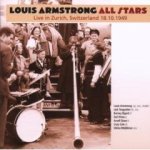Home » Jazz Articles » Profile » Arthur Doyle
Arthur Doyle
Doyle was born in Birmingham, Alabama on Jun. 25th, 1944, the second of five children. Inspired to play music by Louis Armstrong and Duke Ellington on TV, the sound of the saxophone fascinated him as a child. His first gig as a teenager was with Sun Ra alumni trumpeter Walter Miller. "It paid six dollars," Doyle recalled in a 1994 interview with Cadence magazine. Following a degree in Music Education at Tennessee State University in Nashville, Doyle stayed in the area, gigging with Gladys Knight and the Pips and Donny Hathaway among others, grounding him in the R&B which was to reemerge later in his solo work. At the same time he played bop, touring as far as Detroit.
Initially Doyle was unmoved by reports of the New Thing of John Coltrane, Archie Shepp and Pharoah Sanders, telling WHRW Radio in 1979, "No man, I didn't want to play that shit. I just wanted to study some more. I learned all these changes and scales and arpeggios. I couldn't abandon all that." But with social change afoot, Doyle played at a Black Panthers festival channeling the same rhetoric as Shepp and others and little by little moved to the related style of music. "When I first got to New York, I tried to play both musics but I thought I had to give a total commitment to what I was doing. You can't play bop and then turn around and play some freeform." A friend saw drummer Milford Graves playing on the street and told him he knew a musician from Nashville who played the same sort of music. Graves gave him his number and so Doyle hooked up with him and also began sitting in on dates with Sanders and Sun Ra.
Part of Doyle's mystique has been his appearance on some of free jazz' most important documents: his earliest recording was the classic The Black Ark (1969) under alto saxophonist Noah Howard's leadership, while his next exposure was on Graves' Babi Music (1976). It wasn't until 1977 that he made his leadership debut, his much sought after quintet recording Alabama Feeling. Sonic Youth guitarist Thurston Moore cites this disc as one of the Top Ten from the Free Jazz Underground, for "its incredible post-Aylerisms—mystic music which took on the air of chasing ghosts and spirits through halls of mirrors."
Like many of his peers, a greater appreciation for his music in Europe attracted Doyle to Paris in the early '80s, but there was to be a bitter twist. Accused of rape, Doyle was imprisoned for five years until released in 1988, still maintaining his innocence. During that time, without access to a horn, he composed some 150 songs, which he set about documenting once he had got himself back in the frame of mind to play again. Recorded onto a portable cassette recorder, a series of low-fi solo recordings appeared on small independent labels through the '90s, featuring raw shrieking saxophone alongside sometimes otherworldly vocals.
Doyle's unique sound on the saxophone was something that happened by accident. He told Cadence: "I had this reed on that was too soft and my voice came through my saxophone. I liked the sound so I began singing and playing at the same time." Even applying the same technique to the flute, he found that this wasn't enough to express all he wanted and now alternates saxophone and flute with passages of singing and chanting, with the words sometimes slurring into scatting and sounds. Doyle terms his music "free jazz soul music" and in a strange way it does combine the repetition of the R&B he played in his youth with the passionate conviction music of his adult self. "You can't separate the singing from the saxophone, you can't separate the flute from the saxophone, you can't separate none of it from the saxophone. It all revolves around one instrument and that is Me, Myself," he asserted in a 1998 interview.
Life has come full circle for Doyle who once again lives back in Birmingham, making New York appearances all the more rare. He last played in town at the now defunct Tonic back in 2006. Make the most of chances to catch this still indefatigable spirit.
Recommended Listening
Noah Howard, The Black Ark (Freedom-Bo'Weavil, 1969)Milford Graves, Babi Music (IPS, 1976)
Arthur Doyle, Alabama Feeling (AK-BA—DRA, 1977)
The Blue Humans, Live NY 1980 (Audible Hiss, 1980)
Arthur Doyle, Prayer for Peace (Zugswang, 1999)
Arthur Doyle/Sunny Murray, Live at Glenn Miller Cafe (Ayler, 2000)
Tags
Arthur Doyle
Profiles
John Sharpe
United States
New York
New York City
John Coltrane
archie shepp
Pharoah Sanders
Sun Ra
Noah Howard
PREVIOUS / NEXT
Support All About Jazz
 All About Jazz has been a pillar of jazz since 1995, championing it as an art form and, more importantly, supporting the musicians who make it. Our enduring commitment has made "AAJ" one of the most culturally important websites of its kind, read by hundreds of thousands of fans, musicians and industry figures every month.
All About Jazz has been a pillar of jazz since 1995, championing it as an art form and, more importantly, supporting the musicians who make it. Our enduring commitment has made "AAJ" one of the most culturally important websites of its kind, read by hundreds of thousands of fans, musicians and industry figures every month.
























